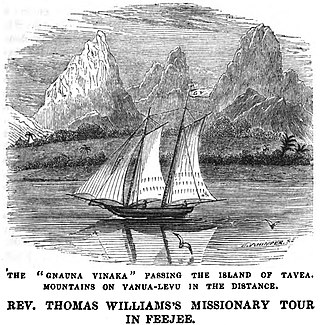
Articles about people, places, things, and concepts related to or originating from Fiji, include:

Vanua Levu formerly known as Sandalwood Island, is the second largest island of Fiji. Located 64 kilometres to the north of the larger Viti Levu, the island has an area of 5,587.1 square kilometres (2,157.2 sq mi) and a population of 135,961 as of 2007.

Viti Levu is the largest island in the Republic of Fiji. It is the site of the nation's capital, Suva, and home to a large majority of Fiji's population.
Located in the central Pacific Ocean, Fiji's geography has made it both a destination and a crossroads for migrations for many centuries.

Tavua is a town in Fiji, 91 kilometres from Nadi and 9 kilometres from the gold mining settlement of Vatukoula. It was formally incorporated as a Town in 1992 with the appointment of its first Mayor, Iliesa Vula from Tavualevu. The town covers a land area of 100 square kilometres, and had a population of 2,418 at the 1996 census.

The Fiji Football Association is the governing body of football in Fiji. It came into existence in 1961. It is the overseeing body of the Fiji National Team and its leagues.

The Diocese of Polynesia, or the Tikanga Pasefika serves Anglicans in Fiji, Tonga, Samoa and the Cook Islands, within the Anglican Church in Aotearoa, New Zealand and Polynesia. The diocese's first bishop was consecrated in 1908. The diocese's cathedral is Holy Trinity Cathedral in Suva, Fiji.

The Northern Sharks is a former Fijian rugby union team that had a franchise area covering Vanua Levu, Taveuni, Ovalau, and Island Zone. The team was added to Fiji's premier Colonial Cup competition in 2005; previously the Northern Division had belonged to the Suva franchise. The Sharks competed in the Cup from 2005 to 2008 before the competition ceased in 2008.

The Suva Highlanders is a Fijian former rugby union team that had a franchise area covering Suva, Naitasiri and Kadavu. The team played in Fiji's premier the Colonial Cup from 2004 to 2008 before the competition ceased in 2008.

The Bligh Roosters is a Fijian former rugby union team that had a franchise area covering Tavua, Vatukoula, Ba and Ra. The team played in Fiji's Colonial Cup in 2007 and 2008 before the competition ceased in 2008.

The Western Crusaders is a Fijian former rugby union team that had a franchise area coverering Lautoka, Nadi, and Yasawa. The team played in the Colonial Cup from 2004 to 2008 before the competition ceased in 2008.

The Coastal Stallions is a former Fijian rugby union team that had a franchise area covering Nadroga-Navosa, Namosi, Serua and Malolo. The team played in Fiji's premier rugby union competition the Colonial Cup from 2004 to 2008, winning the champioshup title three times before the competition ceased in 2008.
The Inter-District Championship (IDC) is the amateur Fijian football cup. Only five teams first took part in the first IDC held in Suva in 1938. From 1938 to 1975, the competition was initially held on a knock out format but in 1976 pool play was introduced. From 1985, the competition was held in two divisions with the introduction of a second level tournament known as the Premier Division. In 1999 there was a short lived third level division. With Navua registering its first ever win of the IDC tournament in 2009, all the current Super Premium Division teams have now won the Lloyd Farebrother Trophy one or more time(s).
The 2007 Colonial Cup was rugby union competition held in Fiji. The Fiji Rugby Union controls the Colonial Cup which is used to pick players for the Fiji national team.
Rail transport in Fiji moves cut sugar cane to crushing mills. Also, there used to be two horse-drawn street tramway systems, some other passenger systems, an underground mine system, and some tramways on construction projects. There are multiple other modes of transport in Fiji.
The sport of football in the country of Fiji is run by the Fiji Football Association. The association administers the national football team as well as the FPL. The national team has had little international success.

Verata is a Tikina in Fiji's Tailevu Province. It is made up of several sub-districts or Tikina makawa, namely: Verata, Namalata, Tai, Vugalei, and Taivugalei.
The Farebrother-Sullivan Trophy is a Fijian rugby union competition open to the regional representative teams of the districts of Fiji.
The 2019 Fiji Senior League was the second-highest division within the Fiji football league system after the Fiji Premier League in Fiji Senior League. It is currently contested by 12 teams with two groups of 6 teams and is run and overseen by the Fiji Football Association in Fiji.
The 2020 Fiji Senior League is the second-highest division within the Fiji football league system after the Fiji Premier League in Fiji Senior League. It is currently contested by 11 teams with two groups of 5 and 6 teams and is run and overseen by the Fiji Football Association.











